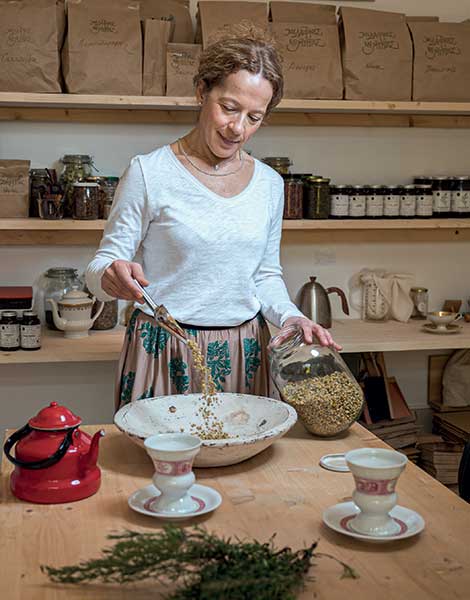The street vendor you might encounter at the corner of Tsimiski and Aristotelous in Thessaloniki knows precisely what he’s offering in that steaming cup: the perfect antidote to the Vardaris, the icy northern wind. The drink, known as salepi and made from the tubers of a type of wild orchid, is a reminder that herbal infusions are one of Greece’s most prized secrets and have been an integral part of Greek life for millennia.
From the foothills of the Pindus Mountains to the villages of Rhodope, the herbal traditions of Northern Greece have been passed down over generations for centuries. Local communities have long known the unique healing properties of the region’s endemic wild plants. From Sideritis, or mountain tea, famed for its ability to ward off winter illnesses, to St. John’s Wort, a panacea for a variety of conditions – dermatological, muscular and more – these herbs were more than just beverages; they were natural medicines that fortified health and helped people cope with the harsh conditions of their life. Today, a new generation of producers and farmers is getting back to basics, reconnecting with the earth and reviving ancient practices to reintroduce these herbs into domestic and worldwide markets. Here, we showcase five enterprises dedicated to the power of Greek herbs and busy creating innovative products from the bounty of the land.


sky-high Cultivation
The Holomontas forest is a lush, mountainous area in Halkidiki, home to nearly 2,000 herb species. This botanical wealth inspired the father of Stella and Konstantinos Papakonstantinou to begin harvesting and drying herbs decades ago. Today, three decades later, the siblings, together with Konstantinos’ wife, Zoe Vordou, continue this tradition. They cultivate 30 distinct herb varieties at an elevation of 870 meters. The high elevation plays a crucial role – plants grown at these heights are naturally richer in antioxidants, delivering a potency that reflects the purity and vitality of the landscape.
At Holomon Organic Herbs, you’ll find everything from mountain tea and lavender to St. John’s Wort, rockrose, and a local variety of mint (Calamintha). Lesser-known herbs include coltsfoot, used for treating coughs, and bramble, recommended for hypertension.
Another small organic herb farm is thriving in Galini, just 45 kilometers north of Thessaloniki. Michalis Georgaras and Anastasia Vasileiadou launched Aetheleon a decade ago, with oregano, a phenol-rich herb with antiviral characteristics, as their main product. “Oregano is an herb that international markets associate with Greece,” says Michalis. Today, 95% of Aetheleon’s production is exported to Germany, the UK, and the USA. One of their most unique offerings is an oil that combines extra virgin olive oil from Lesvos with a hint of potent oregano essential oil. This product is often used as a natural remedy, with many mothers giving their children a spoonful every day to protect against winter diseases.

wild beauty
Nature’s Pharmacy, the family business of Spyros Nikolaidis, a third-generation pharmacist, offers herbal infusions, tinctures, oils, capsules, and homeopathic and galenic formulations created in their lab. The term “galenic,” named after the ancient physician Galen, refers to personalized remedies tailored to meet each patient’s specific needs. Spyros and his wife, Olga Akrivou, founded Physis Laboratory, which manufactures personal care and wellness products now available both online and in international stores. Their bestsellers include milk thistle, wild artichoke and samphire, whose antioxidant properties are used in facial creams. They also use Rhodiola rosea and safflower for their mood-boosting effects. The efficacy of their products has been confirmed through biochemical test results of customers who turned to herbal remedies for specific health issues.

a Sense of Place
“Herbs are meant to be enjoyed, not just taken as medicine.” This is the philosophy of Kyveli Pantelakou and Vivi Panagiotidou, founders of Arritos, a small company that specializes in unique blends of Greek herbs. In their Thessaloniki workshop, they create innovative mixtures using organically grown herbs from selected producers across Greece. Popular blends include lemon verbena, mountain tea (known on Crete as “malotira”), mint and the aromatic peel of the Chios mandarin. They also pair geranium leaves with dried strawberry pieces and mix Chios mastic with linden, a calming and soothing herb. Their products are packaged in handmade cotton pouches inspired by the traditional way of storing herbs to prevent oxidation.
The founders of Rhoeco – Haris Kazas, Katerina Chatziangelaki and Vagia Mitsiou – cater to international tastes, showcasing Greek herbs as flavorful, caffeine-free alternatives to traditional teas. For example, they suggest nettle as a substitute for green tea. Rhoeco works with organic farmers across northern Greece, from Olympus and Imathia to Amphipolis and the Pomak villages of Thrace. Their commitment to sustainability is reflected in their eco-friendly packaging, which includes a cup that also serves as a planter for the seed placed in the lid.


© Vangelis Zavos
Mountain magic
Sophia Triantou, a certified herbalist and tea sommelier, has explored many of Greece’s herb-growing and foraging regions. “Northern Greece is a rich botanical zone,” she says, “particularly around Mt Olympus in Pieria and Holomontas in Halkidiki, and includes notable organic farms all the way from Imathia to Rodopi.” Some herbs, she points out, are endemic to high elevations, where they flourish in their purest form. Among these, the mountain tea of Olympus stands out. “Our grandmothers used its infusion to treat colds, and modern research confirms its anti-inflammatory properties and digestive benefits.”
Sophia is a strong advocate for using herbs daily, not only in cooking but also in beauty routines. She even hosts three-day retreats on Mt Olympus, where participants are introduced to the properties of key Greek herbs. During these retreats, guests prepare foods using these herbs, such as rosemary-infused bread and vegetable meatballs seasoned with parsley and mint, and they also make homemade skincare products. Regarding beauty products, Sophia mentions, among other things, the intense regenerative action of oats; for an even more radiant glow, they can be used as a base when making a chamomile face mask.












